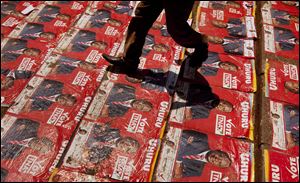
Kenyans pray for peace, unity the day before fiercely contested elections
3/3/2013
A supporter walks down steps plastered with campaign posters of Kenyan Presidential candidate Uhuru Kenyatta at his campaign's final rally at Uhuru Park in Nairobi, Kenya Saturday.
NAIROBI, Kenya — Clerics across Kenya gave sermons dedicated to peace today, the day before a national election that some fear could spark the same kind of violence that engulfed the East African country after its disputed 2007 vote.
Many in this heavily Christian nation went to their parishes to pray that the Monday election does not become too polarized along ethnic lines.
More than 1,000 people were killed after Kenya's December 2007 election, making Monday's vote the most important in the country's 50-year history. It's also one of its most complicated: A secessionist group on the coast is threatening violence; Somali militants could launch attacks; and the tribes of the top two presidential candidates have a long history of tense relations.
In addition, 47 new governor races are being held, increasing the chances of electoral tensions at the local level.
Perhaps most importantly, Uhuru Kenyatta, one of two top candidates for president, faces charges at the International Criminal Court for orchestrating the 2007-08 postelection violence. If he wins, the U.S. and Europe could scale back relations with Kenya, and Kenyatta may have to spend a significant portion of his presidency at The Hague.
Kenyatta's running mate, William Ruto, also faces charges at the ICC.
Kenyatta, a Kikuyu who is the son of Kenya's founding president, faces Raila Odinga, a Luo whose father was the country's first vice president. Polls show the two in a close race, with support for each in the mid-40-percent range. Eight candidates are running for president, making it likely Odinga and Kenyatta will be matched up in an April run-off, when tensions could be even higher.
At the Nairobi Chapel, an evangelical church in the capital, three pastors took turns today praising the attributes of some tribes, drawing cheers from the congregation. The Kikuyus were praised for being entrepreneurial, the Luos for valuing education, and the Kalenjins — Ruto's tribe — for their loyalty.
“Tomorrow we celebrate our cultural diversity as a nation,” Nick Korir said in his sermon. “A lot of things unite us as a church. A lot of things unite us as a country.”
In the weeks leading up to Monday's vote, described by Odinga as the most consequential since independence from the British in 1963, peace activists and clerics have been praying that this time the election is peaceful despite lingering tensions.
Odinga's acrimonious loss to President Mwai Kibaki in 2007 triggered violence that ended only after the international community stepped in to mediate. Odinga was named prime minister in a coalition government led by Kibaki, with Kenyatta named deputy prime minister.
The candidates held their final rallies Saturday, a day of political attacks and denials following published comments attributed to Odinga that election violence could be worse than 2007-08 if the vote is rigged. Today church leaders asked their congregations to disappoint those who suspect there will be violence.
“We ask you to shame all prophets of doom,” a cleric at an evangelical church in Nairobi called Mavuno told a packed congregation. “This is a country we are all proud of despite the divisions that people talk about. There is a Kenya after tomorrow.”
Some 99,000 police officers will be on duty during an election in which some 14 million people are expected to vote. Kenyans will also be electing new lawmakers, governors and other officials.
Kenyatta, 51, the son of Jomo Kenyatta, the country's founding president, is one of the country's wealthiest men. He studied at Amherst College in the U.S. before returning home to become a businessman and later his father's political heir.
In 2011 Forbes magazine listed him as the wealthiest Kenyan, worth at least $500 million, although he was dropped from a subsequent list because his personal wealth was hard to separate from that of his close relatives. The Kenyattas are said to own hundreds of thousands of acres of prime land across the country, a controversial point in a nation where millions do not own even a small plot of land.
Gladwell Otieno, a Kenyan who runs a think tank called The Africa Center for Open Governance, said it would “be difficult for (Kenyatta) to claim that he can do much” to tackle Kenya's historical land problem. But despite the baggage of wealth and the ICC charges, Kenyatta's team has done a good job of marketing him as “a youthful candidate” of hope, Otieno said.
“Our main concern has been the fact that he is indicted at the ICC,” Otieno said. “A government led by him would immediately be paralyzed.”
Odinga, 68, who has been prime minister since 2008, believes he was cheated out of victory in the last election. Odinga's refusal to accept the results of the 2007 election helped fuel tribal tensions, with many here seeing Kibaki's win as another example of the Kikuyu's overly broad influence.
A win by Odinga would make him the country's first Luo president, a feat never accomplished by his father, Oginga Odinga, who was Kenya's first vice president and himself a hero of the anti-colonial movement. The elder Odinga fell out with Jomo Kenyatta, Kenya's first president, straining Kikuyu-Luo relations for decades.
In a rally Friday in Kisumu, Odinga's hometown and the biggest Luo-dominated city, Odinga repeatedly used words like “freedom” and “change” to emphasize the epochal moment it would be for his people if he wins.
“Be prepared for freedom,” he said. “This country is at the verge of total liberation.”